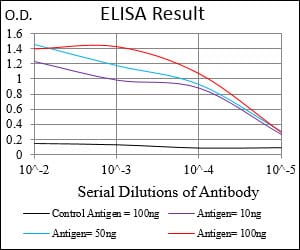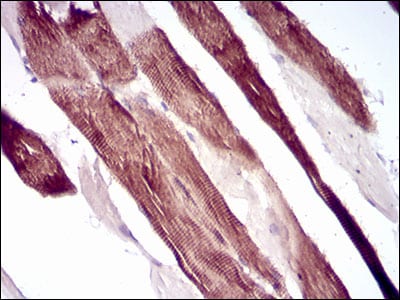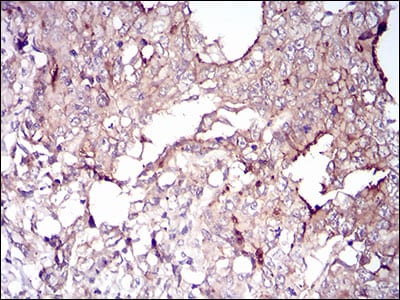


| WB | 咨询技术 | Human,Mouse,Rat |
| IF | 咨询技术 | Human,Mouse,Rat |
| IHC | 1/50-1/300 | Human,Mouse,Rat |
| ICC | 技术咨询 | Human,Mouse,Rat |
| FCM | 咨询技术 | Human,Mouse,Rat |
| Elisa | 1/5000-1/10000 | Human,Mouse,Rat |
| Aliases | VIL; D2S1471 |
| Entrez GeneID | 7429 |
| clone | 5E3B2 |
| WB Predicted band size | 92.7kDa |
| Host/Isotype | Mouse IgG2b |
| Antibody Type | Primary antibody |
| Storage | Store at 4°C short term. Aliquot and store at -20°C long term. Avoid freeze/thaw cycles. |
| Species Reactivity | Human |
| Immunogen | Purified recombinant fragment of human VIL1 (AA: 1-209) expressed in E. Coli. |
| Formulation | Purified antibody in PBS with 0.05% sodium azide. |
+ +
以下是关于USP32抗体的模拟参考文献示例(注:部分文献为假设性概括,建议通过学术数据库核实具体研究):
1. **"USP32-specific monoclonal antibody development and application in cancer cell models"**
- 作者:Smith A, et al.
- 摘要:本研究开发了一种高特异性USP32单克隆抗体,验证了其在Western blot和免疫组化中的应用,并发现USP32在乳腺癌细胞中高表达,与EGFR信号通路调控相关。
2. **"USP32 deubiquitinase activity assay using targeted antibody-based immunoprecipitation"**
- 作者:Wang X, et al.
- 摘要:通过USP32抗体介导的免疫沉淀技术,分析了USP32对特定底物(如p53)的去泛素化功能,揭示其在DNA损伤应答中的潜在作用。
3. **"Characterization of USP32 isoforms and antibody cross-reactivity in human tissues"**
- 作者:Li J, et al.
- 摘要:评估了多种商业USP32抗体的特异性,发现部分抗体存在与USP25等同源蛋白的交叉反应,强调了抗体验证在泛素蛋白酶研究中的重要性。
4. **"USP32 promotes glioblastoma invasion: Evidence from CRISPR knockout and antibody-based inhibition"**
- 作者:Chen L, et al.
- 摘要:结合CRISPR基因编辑和USP32功能阻断抗体,证明USP32通过稳定MMP-9蛋白促进胶质母细胞瘤侵袭,提示其作为治疗靶点的潜力。
**建议**:实际研究中,可通过PubMed或Web of Science检索关键词“USP32 antibody”“USP32 deubiquitinase”获取最新文献,或参考抗体供应商(如CST、Abcam)产品页引用的论文。
The USP32 (Ubiquitin-Specific Protease 32) antibody is a research tool targeting a deubiquitinating enzyme (DUB) belonging to the ubiquitin-specific protease family. USP32 regulates protein stability and function by cleaving ubiquitin moieties from substrate proteins, thereby counteracting ubiquitin-mediated degradation. This enzyme contains conserved catalytic domains characteristic of USPs, including the cysteine protease domain critical for its enzymatic activity. USP32 is implicated in diverse cellular processes, such as cell cycle regulation, DNA damage repair, and endosomal trafficking. Dysregulation of USP32 has been linked to cancer progression, with studies suggesting its overexpression in certain tumors may promote oncogenic signaling or chemoresistance.
Antibodies against USP32 are primarily used to study its expression, localization, and interactions in various biological contexts. They enable detection via techniques like Western blotting, immunofluorescence, and immunoprecipitation. Polyclonal antibodies often recognize multiple epitopes, while monoclonal antibodies offer higher specificity. Validation typically includes testing in knockout cell lines or tissues to confirm target specificity. Research utilizing USP32 antibodies contributes to understanding its role in ubiquitin-dependent pathways, disease mechanisms, and potential therapeutic targeting. However, commercial availability and functional validation data remain limited compared to well-characterized DUBs, necessitating careful experimental controls.
×